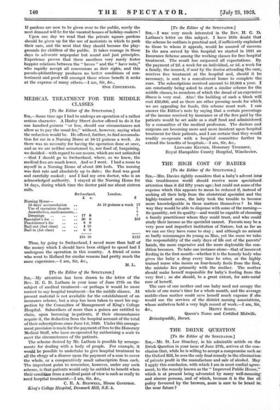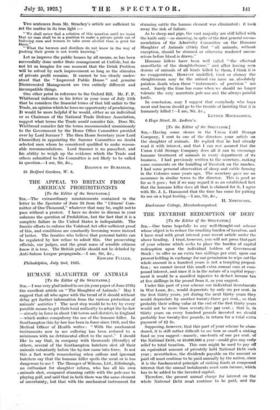THE DRINK QUESTION
[To the Editor of the SPECTATOR.]
Srn,—Mr. St. Loe Strachey, in his admirable article on the Drink Question in your issue of June 27th, arrives at the con-, elusion that, while he is willing to accept a compromise such as; the Oxford Bill, he sees the only final remedy in the elimination{ of private profit in the manufacture and sale of alcohol. May I apply this conclusion, with which I am in most cordial agree- ment, to the remedy known as the " Improved Public House,"' which is at present being advocated by many well-meaning! and sincere persons, and of which, because it is the line ofl policy favoured by the brewers, more is sure to be heard in the near future ? Two sentences from Mr. Strachey_ 's article are sufficient to set the matter in its true light :— " We shall never find a solution of this question until we insist %hat no man shall be in a position to make a private profit out of inducing men and women to take more alcohol than is good for them."
" What the brewers and distillers do not know in the way of pushing their goods is not worth knowing."
Let us improve the public houses by all means, as has been successfully done under State management at Carlisle, but do not let us imagine for one moment that the Drink Problem will be solved by such improvement so long as the stimulus of private profit remains. It cannot be too clearly under- stood that the " Improved Public House " and genuine Disinterested Management are two entirely different and incompatible things.
One other point in reference to the Oxford Bill. Mr. F. P. Whitbread indicates in his letter in your issue of July 11th that he considers the financial terms of that bill unfair to the Trade, an opinion which he loses no opportunity of proclaiming. It would be more helpful if he would, either as an individual or as Chairman of the National Trade Defence Association, suggest what terms the Trade would consider fair. Does Mr. Whitbread consider fair the terms recommended unanimously to the Government by the Home Office Committee presided over by Lord Sumner ? The then Home Secretary (now Lord Chancellor) in appointing the Sumner Committee no doubt selected men whom he considered qualified to make reason- able recommendations. Lord Sumner is no pussyfoot, and his ability to weigh up the evidence which the Trade and others submitted to his Committee is not likely to be called in question.—I am, Sir, &c.,



























































 Previous page
Previous page